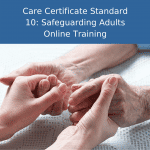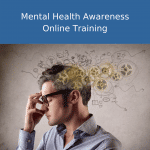Description
Loss and Bereavement Course
Supporting the bereaved is a crucial responsibility of healthcare professionals. Enhance your skills with our online Loss and Bereavement training course, specifically designed for health and social care workers.
Gain a comprehensive understanding of the various stages of loss and deepen your knowledge of bereavement. This course empowers you to provide effective support and care to those experiencing grief.
- Developed by professionals
- Accredited by The CPD Accreditation Group
- 100% online, learn at your own time and pace
- Translates into over 100 different languages
- Instant certificate downloaded
This course has been designed for those encountering bereaved people in their professional life, to help them understand the issue surrounding bereavement and how to communicate with clients and customers after someone close to them has died.
In this course, we’ll aim to:
– Improve our understanding of the definitions of loss
– Explore the 5 stages of the grieving process
– Think about ways we can support ourselves during this process
– Think about ways we can support others during this process
– Raise our awareness of where to find information, support and counselling
Bereavement Awareness Course Outline:
This course has been designed for those encountering bereaved people in their professional life. This is to help them understand the issue surrounding bereavement and how to communicate with clients and customers after someone close to them has died.
The key points covered in this course are:
- The stages of dying
- Cultural awareness
- Pathways
- Duty of care
- Managing the environment
- Record keeping
- Maintaining attitude and behaviour
1. The stages of dying:
This section of the course delves into the different stages that individuals may experience when nearing the end of life. Understanding these stages enables healthcare professionals to provide appropriate support and care, addressing the unique needs and concerns of individuals during this critical period.
2. Cultural awareness:
Recognizing and respecting cultural differences is vital when supporting the bereaved. This module explores various cultural perspectives on death, grief, and mourning. By enhancing cultural awareness, healthcare professionals can deliver culturally sensitive care, ensuring the bereaved receive support that aligns with their beliefs, traditions, and values.
3. Pathways:
This component explores the different pathways individuals may traverse during the grieving process. It provides insights into common reactions, emotions, and challenges individuals may face at various stages of bereavement. Understanding these pathways equips healthcare professionals to anticipate and respond effectively to the diverse needs of the bereaved.
4. Duty of care:
This topic highlights the ethical and legal responsibilities healthcare professionals have when caring for the bereaved. It emphasizes the duty to provide compassionate, competent, and respectful care while upholding confidentiality, privacy, and professional boundaries.
5. Managing the environment:
Creating a supportive and comforting environment is essential when providing bereavement care. This segment covers practical strategies for managing physical spaces, ensuring they are conducive to privacy, tranquility, and emotional well-being. It also addresses techniques for effective communication and establishing a safe and empathetic atmosphere.
6. Record keeping:
Accurate and detailed record keeping is crucial in bereavement care. This module covers the importance of maintaining comprehensive records, documenting interventions, assessments, and conversations. Proper record keeping supports continuity of care, collaboration with multidisciplinary teams, and enables accurate reporting and analysis.
7. Maintaining attitude and behavior:
This aspect focuses on the attitudes, behaviors, and communication skills needed to provide effective support to the bereaved. It emphasizes the importance of empathy, active listening, non-judgmental attitudes, and appropriate verbal and non-verbal communication. Understanding how to maintain a compassionate and professional demeanor enhances the overall quality of care provided to the bereaved.
Learning outcome
By completing our online Loss, Bereavement and Support training course, learners will gain knowledge and understanding in the following areas:
- The stages of dying: Acquire insights into the stages of dying and develop strategies for coping with change.
- Cultural awareness: Embrace cultural sensitivity and adopt a non-judgmental approach in supporting diverse individuals.
- Pathways: Understand the journey towards a peaceful end-of-life experience.
- Duty of care: Uphold privacy, dignity, and respect while fulfilling the duty of care.
- Managing the environment: Learn effective techniques for managing the environment to create a supportive atmosphere.
- Family and visitors: Recognize the need for support and guidance for family members and visitors coping with loss.
- Record keeping: Gain proficiency in documenting questions and implementing best practice responses.
- Maintaining attitude and behavior: Discover ways to maintain a positive attitude and professional behavior in providing support.
Frequently Asked Questions
What is Bereavement Training?
Bereavement training is a type of learning that helps people learn how to support others who are grieving. It provides knowledge and skills to understand the emotions and challenges faced by those who have lost a loved one.
The training teaches practical ways to communicate, offer comfort, and show empathy. By participating in bereavement training, individuals can better assist and care for those going through the difficult process of grief and healing.
Who should take the loss and bereavement online training?
This Loss and Bereavement Training course is suitable for a wide range of individuals, including:
- Healthcare professionals: Doctors, nurses, therapists, and other medical staff who encounter bereaved individuals in their practice.
- Social workers: Professionals working in social services, community organizations, or counseling settings.
- Caregivers: Individuals providing care and support to patients, the elderly, or those facing end-of-life situations.
- Funeral service professionals: Funeral directors, morticians, and staff involved in the funeral industry.
- Counselors and therapists: Mental health professionals specializing in grief counseling or therapy.
- Volunteers: Individuals volunteering in hospices, bereavement centers, or other support organizations.
- Educators: Teachers, instructors, and trainers in healthcare or counseling programs.
- Any individual interested in gaining a better understanding of loss and grief to provide support to family, friends, or colleagues experiencing bereavement.
No prior experience or qualifications are necessary to benefit from this training course.
It is open to anyone who wants to enhance their knowledge and skills in supporting others through the process of loss and bereavement.






